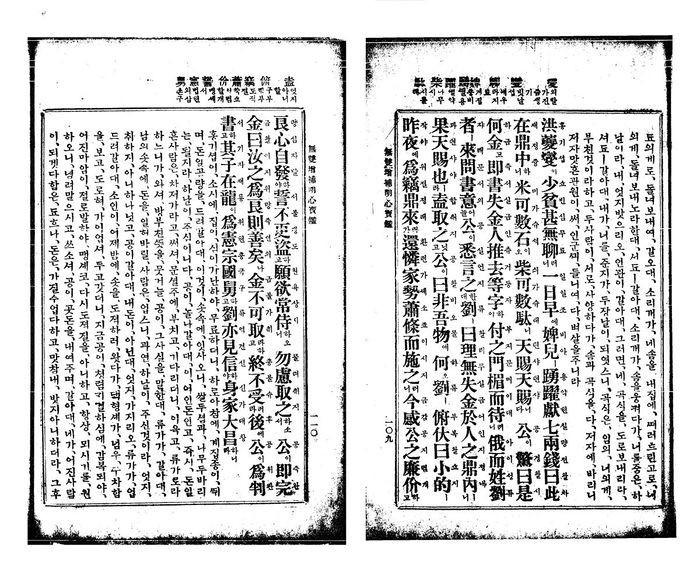(Translation) 2019 洪夔燮
| Primary Source | ||
|---|---|---|
 |
Title | |
| English | Hong Kisŏp | |
| Chinese | 洪夔燮 | |
| Korean(RR) | 홍기섭 | |
| Text Details | ||
| Genre | ||
| Type | ||
| Author(s) | 秋適 (Myŏngsim pogam 明心寶鑑) | |
| Year | 13~14C | |
| Source | ||
| Key Concepts | ||
| Translation Info | ||
| Translator(s) | Participants of 2019 JSG Summer Hanmun Workshop (Intermediate Training Group) | |
| Editor(s) | ||
| Year | 2019 | |
Original Script
Translation
Student Translation : Ethan
一日朝,婢兒踊躍獻七兩錢,曰此在鼎中,米可數石,柴可數馱,天賜天賜。
One morning, Mr. Hong’s maid jumped up and presented him with seven ryang [legal currency weight known elsewhere as tael], saying “the money was in the caldron, it’s worth several sŏk of rice, several bundles of firewood, [a gift] bestowed by the heavens.”
公驚曰,是何金,卽書失金人推去等字,付之門楣而待。俄而姓劉者來問書意,公悉言之,
Frightened, Mr. Hong said, “What money is this.” He wrote [a notice] immediately for the person who lost [their] money to come and get it and so forth. Then posting the notice above the gate, he waited. Before long, one with the last name Ryu came and asked about the meaning of the notice. Mr. Hong explained all of it.
劉曰理無失金於人之鼎內,果天賜也,盍取之。
Ryu said, “Who would lose their money in another person’s cauldron? Indeed, the heavens [must have] bestowed it. Why not take it?”
公曰非吾物何,劉俯伏曰,”小的昨夜爲窃鼎來. 還憐家勢蕭條而施之,今感公之廉价,願欲常侍,勿慮取之.”
Mr. Hong replied, “It’s not mine, how could I?” Ryu then lay out prostrate and spoke [of what he himself had done], “Last night, [it was] this humble one came to steal the cauldron, but taking pity upon the household for its barrenness, [I] left a donation. Now moved by the duke’s [Mr. Hong’s?/your] uprightness [decency?], I hope to always take care of you; do not worry, take the money.”
願欲常侍,勿慮取之.”
I hope to always look after/assist you; don’t worry over taking the money.
公卽還金曰,汝之爲良則善矣。金不可取,終不受。後公爲判書,
Mr. Hong immediately returned the money and said, “You’re turning into a good person, that’s good. But the money, I can’t take it.” To the end, he did not accept the money. After this, Mr. Hong became a Minister [of the Six Boards],
其子在龍,爲憲宗國舅,劉亦見信,身家大昌。《明心寶鑑.廉義篇》
his son Chae-ryong became the father-in-law to King Hŏnjong, Ryu too was trusted and he and his family prospered greatly. (Myŏngsim pogam [Precious mirror that clears the mind], Yŏmŭi-p’yŏn [Book of Honest Righteousness?])
- Discussion Questions:
(YO) I checked out about the character 夔 and 耆. They should be different characters (that is, they shouldn't be used interchangeably)--the former meaning a kind of a mythical monster, the latter 'old man' or '60 years of age.' I think I copied and pasted from 동양고전종합DB: http://db.cyberseodang.or.kr/front/alphaList/BookMain.do?mId=m02&sMode=M. It turns out quite a few web sites repeat the same. At this point, I can't find a reason that they can be related, except for they are homophonous (기).